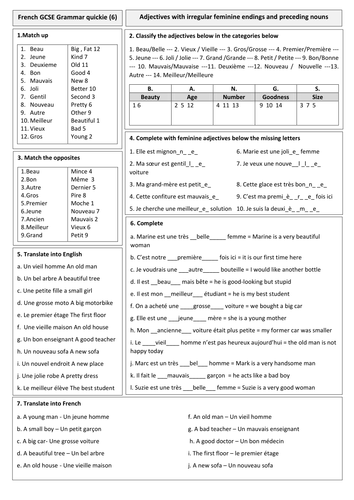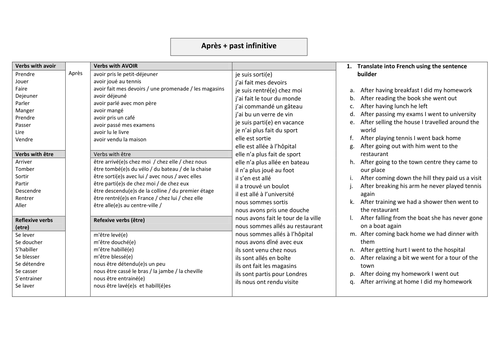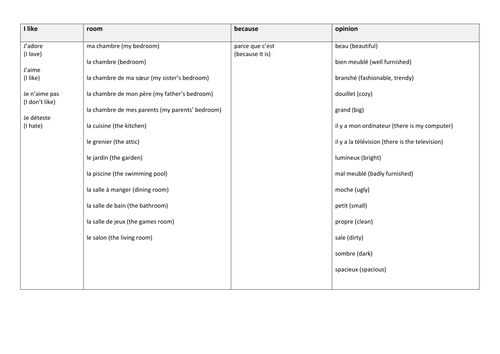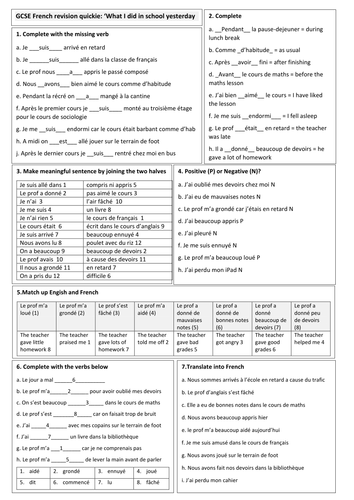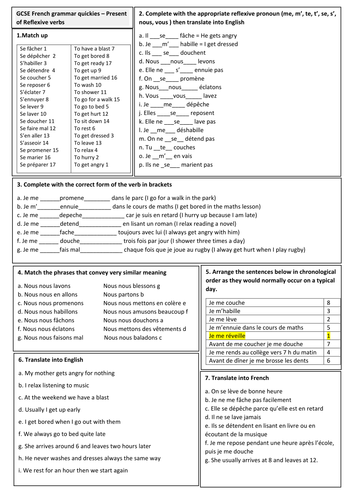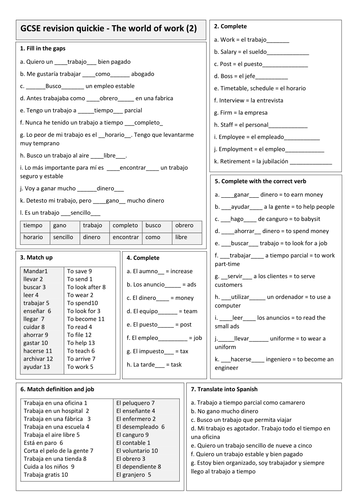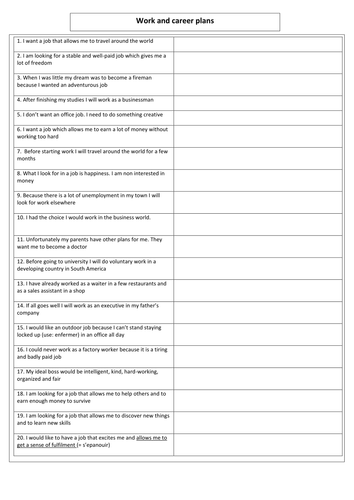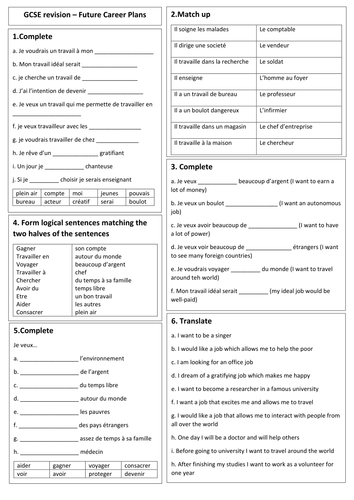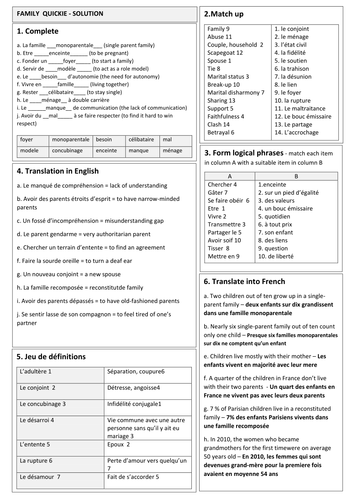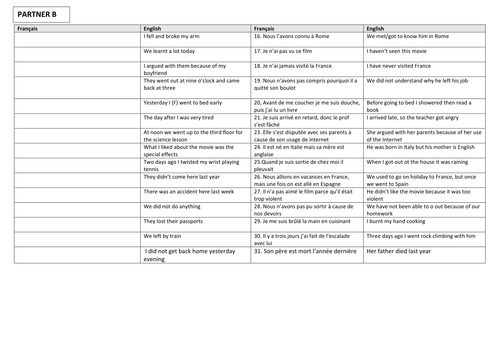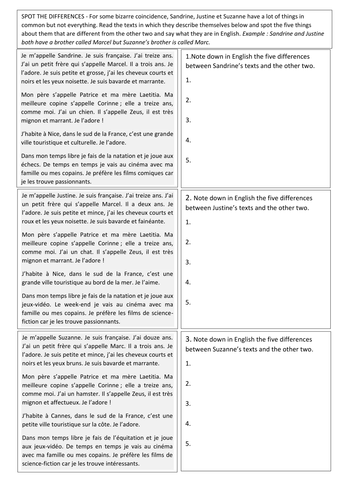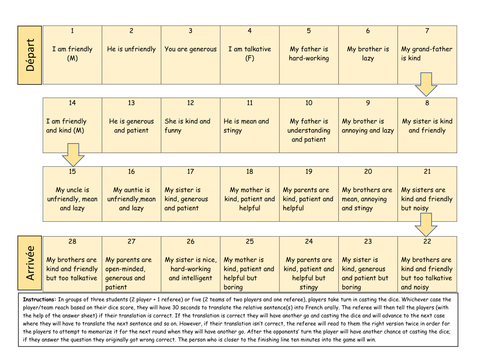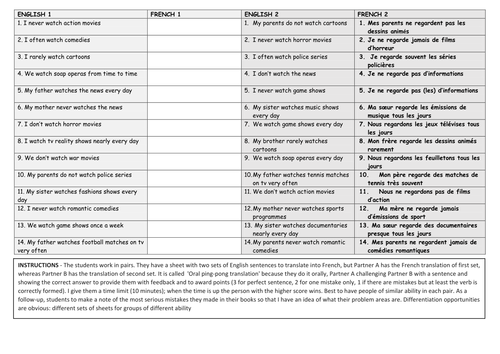
383Uploads
3138k+Views
5726k+Downloads
All resources

GCSE Grammar quickie - Irregular adjectives 1 (with solution)
Consolidation sheet on adjectives with irregular feminine form and preceding nouns

GCSE French - Teaching complex grammar structures (1): Après + perfect infinitive
A sentence builder to illustrate the structure with various verb types and a range of activities to practise it.
Recommended sequence:
1. Make up sentences and utter them to the class (students to translate them on miniboard whilst sentence builder is on display on screen)
2. Ask students to work out the rulese governing the structure. Clarify if necessary how it actually works
3. On miniboards students translate sentences you will have picked out from activity one list
4. Students to do activities 2 to 5 in pairs as you go around the classroom monitoring
5. Communicative oral drills (not included here)
4.

GCSE FRENCH REVISION - Narrow reading on school with pre-reading activity
Five texts recycling key vocabulary + comprehension questions. I use them for listening comprehension, too
Pre-reading activity drumming in vocabulary in narrow reading texts is also included.

KS3/4 French - Health : things to do to stay healthy (2)
Vocab consolidation sheet on things to do stay healthy

KS3 French - Sentence builder and vocab drills on HOUSE
Sentence builder and vocabulary sheet on house

GCSE French quickie (Feb 2017) - What I did yesterday at school (with Answer Key)
A quickie embeddin practice in Perfect Tense in the topic of school life

GCSEFrench revision quickie (HIGHER) - Connective and adverbs (WITH SOLUTION)
Covers main connectives and some adverbs of place and time

GCSE French revision revision quickie – Small function words (with SOLUTIONS)
Covers all sort of small function words students of this level find troublesome (prepositions, demonstratives, relatives and others)

2 NEW Spanish revision quickies WITH ANSWER KEY (March 2017) - World of work
Revision sheets with key vocab covering key terms and imparting model sentences

GCSE revision - Translation on future career plans (French and English version)
A bilingual version of 20 model sentences covering key structures and vocabulary

A LEVEL REVISION QUICKIE - FAMILY (WITH SOLUTION)
A challenging consolidation sheet for A-level students covering key vocabulary

GCSE revision - Oral ping-pong translation__perfect tense
Another oral ping-pong translation
INSTRUCTIONS - The students work in pairs. They have a sheet with the same English sentences to translate into French, but Partner A has the translation of sentences 1 to10, whereas Partner B has the translation of sentences 11 to 20.
I call it 'Oral ping-pong translation' because they do it orally, Partner A challenging Partner B with a sentence and showing the correct answer to provide them with feedback and to award points (3 for perfect sentence, 2 for one mistake only, 1 if there are mistakes but at least the verb is correctly formed). I give them a time limit (10 minutes); when the time is up the person with the higher score wins. Best to have people of similar ability in each pair. Here is an example: I made for a very able year 11 of mine. Obviously the activity can be done in writing too.
As a follow-up, I get the students to make a note of the most serious mistakes they made in their books so that I have an idea of what their problem areas are. Differentiation opportunities are obvious: different sets of sheets for groups of different ability

Year 7 / 8 French - Oral ping-pong translation game (pair-work)
INSTRUCTIONS - The students work in pairs. They have a sheet with the same English sentences to translate into French, but Partner A has the translation of sentences 1 to10, whereas Partner B has the translation of sentences 11 to 20.
I call it 'Oral ping-pong translation' because they do it orally, Partner A challenging Partner B with a sentence and showing the correct answer to provide them with feedback and to award points (3 for perfect sentence, 2 for one mistake only, 1 if there are mistakes but at least the verb is correctly formed). I give them a time limit (10 minutes); when the time is up the person with the higher score wins. Best to have people of similar ability in each pair. Here is an example: I made for a very able year 11 of mine. Obviously the activity can be done in writing too.
As a follow-up, I get the students to make a note of the most serious mistakes they made in their books so that I have an idea of what their problem areas are. Differentiation opportunities are obvious: different sets of sheets for groups of different ability

Year 7/8 French - Narrow reading tasks on general description
Three narrow reading texts exploited through 4 different narrow reading tasks

KS3/4 French - Oral or Written translation board game on character description with answer key
Instructions: In groups of three students (2 player + 1 referee) or five (2 teams of two players and one referee), players take turn in casting the dice. Whichever case the player/team reach based on their dice score, they will have 30 seconds to translate the relative sentence(s) into French orally. The referee will then tell the players (with the help of the answer sheet) if their translation is correct. If the translation is correct they will have another go and casting the dice and will advance to the next case where they will have to translate the next sentence and so on. However, if their translation isn’t correct, the referee will read to them the right version twice in order for the players to attempt to memorize it for the next round when they will have another go. After the opponents’ turn the player will have another chance at casting the dice; if they answer the question they originally got wrong correct. The person who is closer to the finishing line ten minutes into the game will win.
I do a round in writing (students write on miniwhiteboards or iPads) then one or two orally changing partners each time. Students love it but adequate prep essential.

KS2/3 French - Oral translation board game on French basics (personal info)
Instructions: In groups of three students (2 player + 1 referee) or five (2 teams of two players and one referee), players take turn in casting the dice. Whichever case the player/team reach based on their dice score, they will have 30 seconds to translate the relative sentence(s) into French orally. The referee will then tell the players (with the help of the answer sheet) if their translation is correct. If the translation is correct they will have another go and casting the dice and will advance to the next case where they will have to translate the next sentence and so on. However, if their translation isn’t correct, the referee will read to them the right version twice in order for the players to attempt to memorize it for the next round when they will have another go. After the opponents’ turn the player will have another chance at casting the dice; if they answer the question they originally got wrong correct. The person who is closer to the finishing line ten minutes into the game will win.
I do a round of written transl and one of oral changing partners

KS3/4 French - Pool of resources on talking about TV
- reading tasks on opinions about tv
- consolidation activities
- a tile puzzle
- translation practice with answer key
- a sentence builder to introduce vocabulary
- talking mats to scaffold oral interaction with follow-up narrow reading

KS3/4 French - Oral scaffold for conversation on TV, narrow reading and oral ping pong translation
1. Talking mats (10 questions about tv habits) + narrow reading including three tenses
2. Oral ping pong translation

